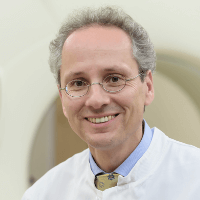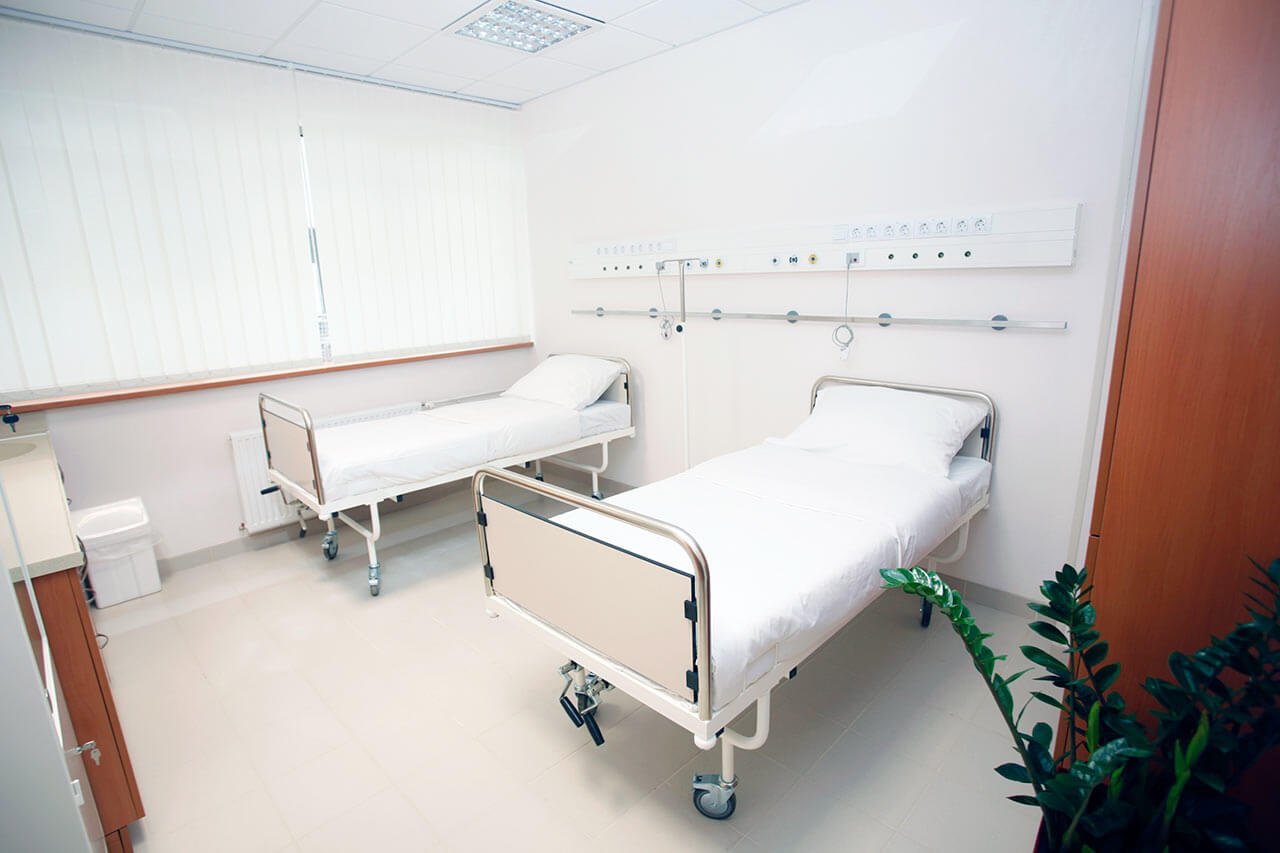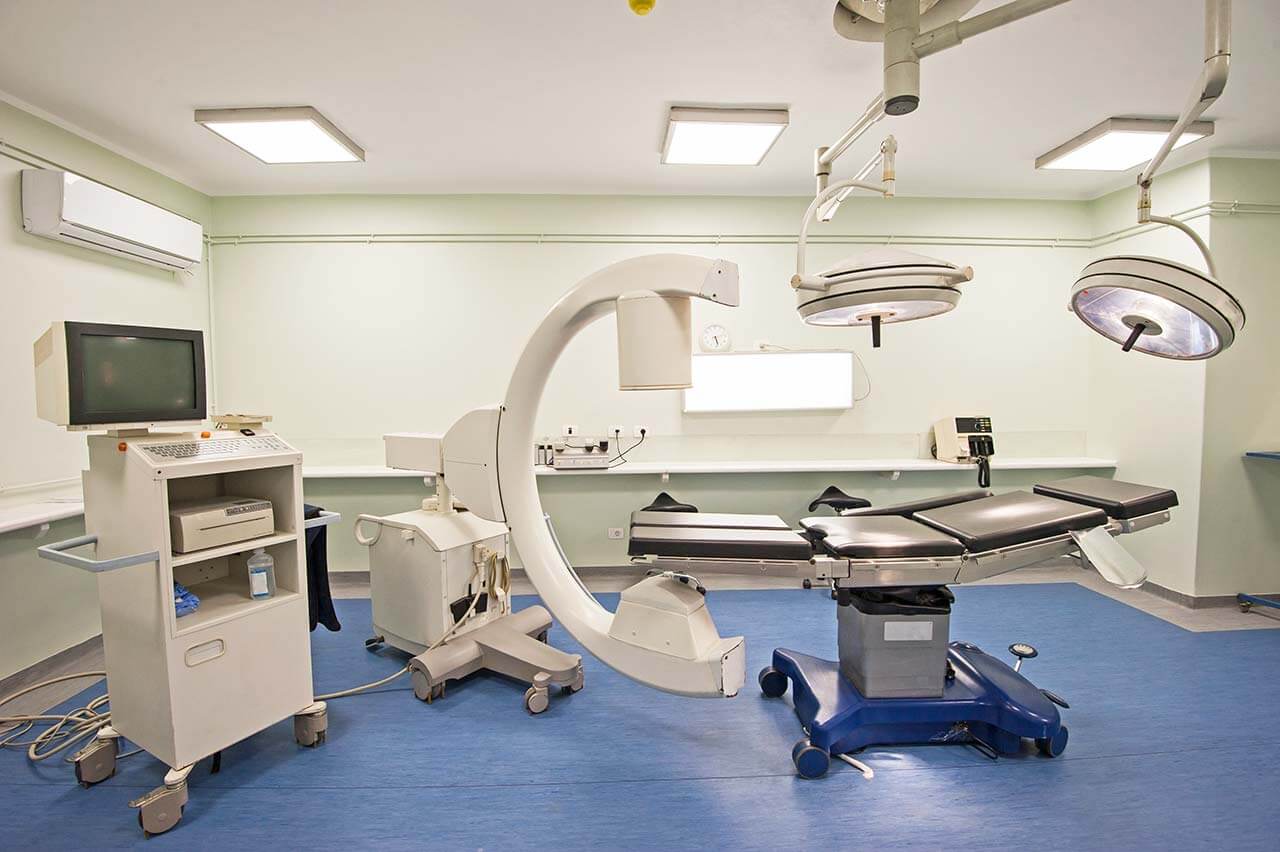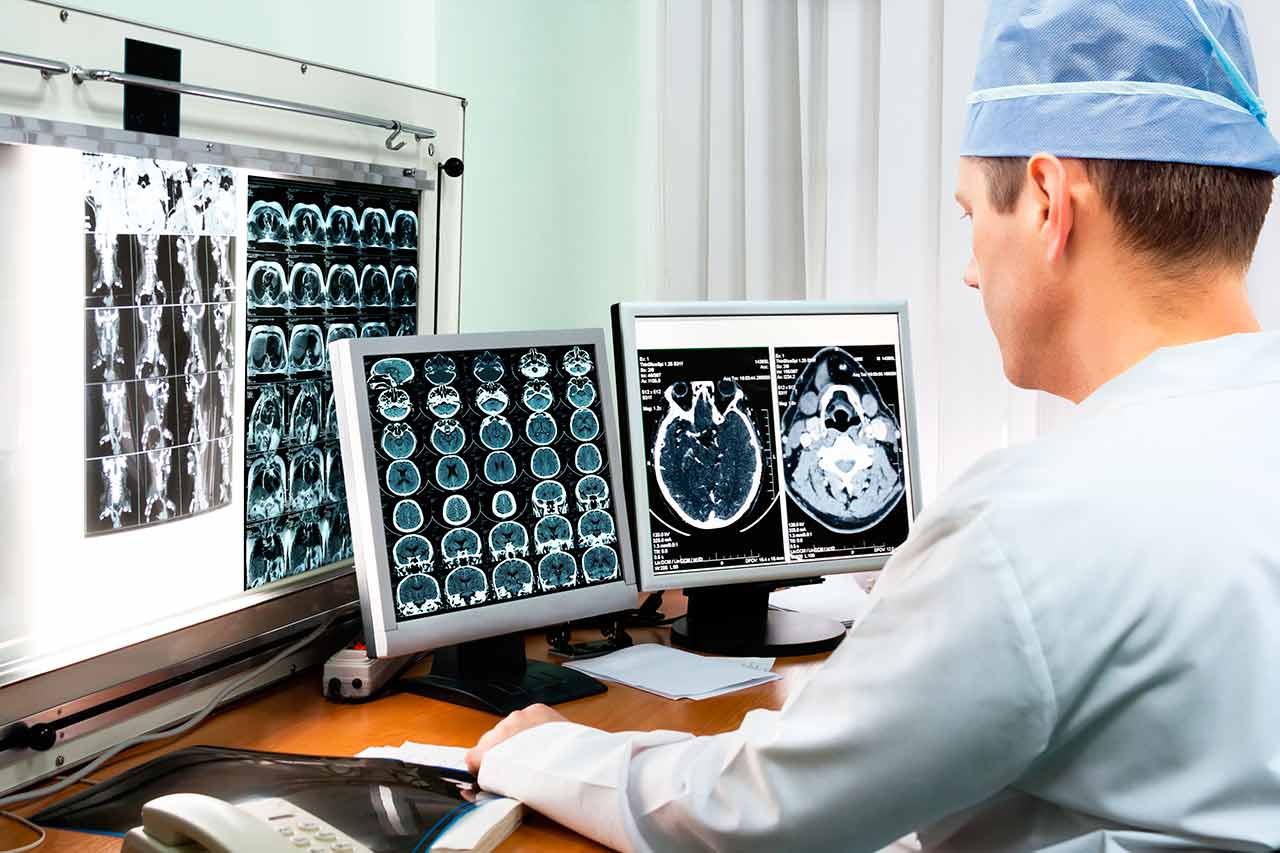
The program includes:
- Initial presentation in the clinic
- clinical history taking
- review of medical records
- physical examination
- laboratory tests:
- complete blood count
- general urine analysis
- biochemical analysis of blood
- TSH-basal, fT3, fT4
- tumor markers
- inflammation indicators
- indicators of blood coagulation
- CT / MRI of the abdomen and retroperitoneum
- abdominal and retroperitoneal ultrasound scan
- full curse of radiotherapy
- nursing services
- consultations of related specialists
- explanation of individual treatment plan
How program is carried out
During the first visit, the doctor will conduct a clinical examination and go through the results of previous laboratory tests and instrumental examinations. After that, you will undergo an additional examination, including complete blood count, laboratory assessment of liver and kidney function. Based on the received results, the physician will conduct radiotherapy planning with the help of CT or MRI, make the permanent tattoo marks on the skin and conduct CT simulation in order to assess the accuracy of the rays and the radiation dose. If necessary, related medical specialists will be involved in the elaboration of a treatment regimen (tumor board).
Radiation therapy is carried out as the day hospital procedure, without mandatory admission to the hospital. At each visit, the physician will assess your general condition and the marks on the skin. After that, you will be placed in a shielded radiation therapy room, on a special table.
Each radiation therapy session lasts less than half an hour (including preparation). All this time, doctors and nurses are monitoring your condition, you can communicate with them through a loudspeaker. The procedure is completely painless. Depending on the planned course of treatment, you will visit the hospital from 1 to 3-5 times a week.
After the completion of the radiation therapy course, you will undergo control examinations aimed at assessing your condition and efficacy of treatment. After that you will receive the medical report with detailed recommendations regarding further follow-up and treatment. In the future, you will be able to have a distant consultation with your attending physician and schedule the next course of treatment, if necessary.
Required documents
- Medical records
- MRI/CT scan (not older than 3 months)
- Biopsy results (if available)
Service
You may also book:
 BookingHealth Price from:
BookingHealth Price from:
About the department
According to the Focus magazine, the Department of Radiation Therapy and Radiation Oncology at the University Hospital Muenster ranks among the top German departments specializing in radiotherapy!
The department offers all types of modern radiation therapy for the treatment of malignant and benign diseases, various functional disorders. Depending on the patient's state of health and the course of the disease, radiation therapy can be carried out on an outpatient or inpatient basis, as well as in combination with other treatment methods, for example, surgery, chemotherapy, immunotherapy, etc. The high-tech equipment, exceptional professionalism of doctors and close cooperation with the specialists from related fields contribute to the provision of first-class and tailored medical care. The Chief Physician of the department is Prof. Dr. med. Hans Theodor Eich.
The department has a tomotherapy system and three high-power linear accelerators (TrueBeam). The equipment and irradiation device is selected for each patient individually, depending on the localization of the pathological area. The external radiation, so-called teletherapy, is carried out using a linear accelerator. In this case, the irradiation applies either protons or electrons. With the help of the very latest high-precision technology, the doctors are able to provide an extremely accurate irradiation, which is the most sparing for healthy tissues. The irradiation with a tomotherapy system is mostly used for the treatment of prostate cancer, large spinal cord tumors or other tumors, in which the protection of surrounding organs is particularly difficult.
In order to ensure the best quality of treatment, the department cooperates with other departments of the university hospital, as well as with external partners. Since 2013, the department’s list of bases was supplemented by the section of the St. Francis Hospital in Muenster. Since November 2014, the department has been cooperating with the German CyberKnife Center at the Soest Hospital.
The service range of the department includes:
- Irradiation planning with CT, PET-CT and PET-MRI
- Standard irradiation methods
- Palliative percutaneous irradiation in metastases
- Total body irradiation (before bone marrow transplantation in order to destroy malignant cells and weaken the patient's immune system (in case of donor transplantation))
- Special irradiation methods
- Intensity-modulated radiation therapy (mostly used for the treatment of prostate cancer, head and neck tumors, breast cancer, pediatric and adolescent tumors)
- Extracranial stereotactic radiation therapy (the most common indications are tumors or metastases in the lungs, liver, secondary irradiation of spinal tumors)
- Intracranial stereotactic radiation therapy (an effective and sparing treatment method for certain benign or malignant tumors, brain arteriovenous malformations)
- Single radiation(radiosurgery)
- Fractionated stereotactic radiation therapy
- Brachytherapy (mostly used for the treatment of gynecologic tumors, prostate cancer)
- Other therapeutic options
Curriculum vitae
- 1988 - 1995 Study of Medicine at the University of Muenster.
- 1991 - 1993 Doctoral Candidate in the Department of Radiation Therapy and Radiation Oncology of the University of Muenster (Head: Prof. Dr. med. N. Willich), preparation of the doctoral thesis under the guidance of Prof. Dr. med. R. Poetter (Chairman of the Board for Radiation Therapy and Radiation Biology, University Hospital Vienna).
- 1996 Doctoral Degree, University of Muenster (magna cum laude).
- 1995 - 1996 Internship, Department of Radiation Therapy and Radiation Oncology, University of Muenster (Head: Prof. Dr. med. N. Willich).
- 1996 - 1997 Internship, Central Institute for X-Ray Diagnostics, University Hospital Essen (Director: Prof. Dr. med. R. Langer).
- 1997 - 1998 Research Fellow, Central Institute for X-Ray Diagnostics, University Hospital Essen (Acting Director: Prof. Dr. med. R.-D. Müller).
- 1998 - 2003 Research Fellow, Department of Radiation Therapy of the University of Cologne (Director: Prof. Dr. med. R.-P. Müller).
- 2002 Medical Specialist in Radiotherapy.
- 2003 - 2011 Senior Physician of the Department of Radiation Therapy at the University of Cologne (Director: Prof. Dr. med. R.-P. Müller).
- 2006 Habilitation in Radiation Therapy.
- Since 09.2011 Head, Department of Radiation Therapy and Radiation Oncology, University Hospital Muenster.
- 12.2012 Medical Director of the Comprehensive Cancer Center Muenster (CCCM).
- 11.2014 Director of the German CyberKnife Center Soest.
Scientific and Organizational Activities
- Since 2002 Deputy Head of the Radiotherapy Reference Center of the German Hodgkin's Lymphoma Study Group (GHSG).
- Since 2002 Member of the Radiotherapy Expert Panel of the GHSG.
- Since 2003 Head of the subproject "Radiotherapy" of the Competence Network Malignant Lymphomas, funded by the German Federal Ministry of Education and Research (BMBF).
- 2010 Member of the Scientific Advisory Board, Journal of Radiation Oncology Biology, Physics.
- 2010 Appointment to the Protocol Committee (Expert) of the German Study Group on Gastrointestinal Lymphomas.
- 2010 Member of the S3 Guidelines Commission on Hodgkin's lymphoma, CLL.
- 2010 Member of the Steering Committee of the International Lymphoma Radiation Oncology Group (ILROG).
- 2006 - 2008, 2012- 2014 Appointment to the Program Committee of the ASTRO (American Society for Therapeutic Radiology and Oncology).
- 2015 Member of S2 Guidelines on Cutaneous Lymphomas.
Photo of the doctor: (c) Universitätsklinikum Münster
About hospital
According to the Focus magazine, the University Hospital Muenster ranks among the top German hospitals!
The hospital belongs to the most prestigious medical institutions in Germany. The hospital is distinguished by a high professionalism of its doctors, state-of-the-art technological equipment and the availability of the most advanced diagnostic and therapeutic capabilities ensuring the first-class medical services. The hospital integrates more than 30 specialized departments, as well as numerous institutes and centers, thus representing all the specialties of modern medicine. The hospital treats more than 64,000 inpatients and 500,000 outpatients every year, which is an indisputable evidence of the highest quality of medical services.
The medical team of the hospital, consisting of more than 10,000 employers, is committed to preserving the physical health of patients, providing them with psychological support and compassionate attitude throughout the entire therapeutic process.
The hospital has succeeded in all specialties of medicine, however, main areas of its specialization include oncology, treatment of cardiovascular, neurological diseases, transplant medicine, psychiatry and psychosomatics, pediatrics with a special focus on rare diseases in children, traumatology, orthopedics, prenatal medicine, and reproductive medicine. In addition, key importance is given to scientific research and training of medical students, so that the specialists of the hospital make a momentous contribution to the development of medicine as a whole.
Photo: (с) depositphotos
Accommodation in hospital
Patients rooms
The patients of the University Hospital Muenster live in single or double rooms. The rooms are made in bright colors and modern design. Each room has an ensuite bathroom with shower and toilet. The standard room includes an automatically adjustable bed, a bedside table, a table and chairs for receiving visitors, a telephone and a TV. The hospital offers access to the Internet. If desired, the patient can also stay in the enhanced-comfort room.
Meals and Menus
The patients of the hospital are offered a tasty and balanced three meals a day: breakfast, lunch and dinner. The menu always features diet and vegetarian dishes. If for any reason you do not eat all the food, you will be provided with an individual menu. Please inform the medical staff about your dietary preferences prior to the treatment.
Further details
Standard rooms include:
Religion
Religious services are available upon request.
Accompanying person
During the inpatient program, an accompanying person may stay with you in a room or at the hotel of your choice.
Hotel
During the outpatient program, you can live at a hotel of your choice. Managers will help you to choose the most suitable options.
The hospital offers a full range of laboratory tests (general, hormonal, tests for infections, antibodies, tumor markers, etc.), genetic tests, various modifications of ultrasound scans, CT scans, MRI and PET / CT, angiography, myelography, biopsy and other examinations. Treatment with medications, endoscopic and robotic operations, stereotaxic interventions is carried out here, modern types of radiation therapy are also used. The hospital offers patients all the necessary therapeutic techniques.
- Stereotactic radiotherapy, including intracranial one
- Thulium and holmium laser enucleation of the prostate
- HIPEC for peritoneal cancer
- Imlantation of mechanical heart support systems
- Assisted reproductive technologies
These are arthrosis and sports injuries of the joints, benign neoplasms and malignant tumors of various localizations, spinal injuries, osteoporosis, benign prostatic hyperplasia, urolithiasis, inflammatory bowel disease and other pathologies.
- Traumatology and hand surgery
- Urology
- General and abdominal surgery
- Cardiology and cardiac surgery
- Obstetrics and gynecology
The hospital's team consists of more than 10,000 highly qualified employees.






